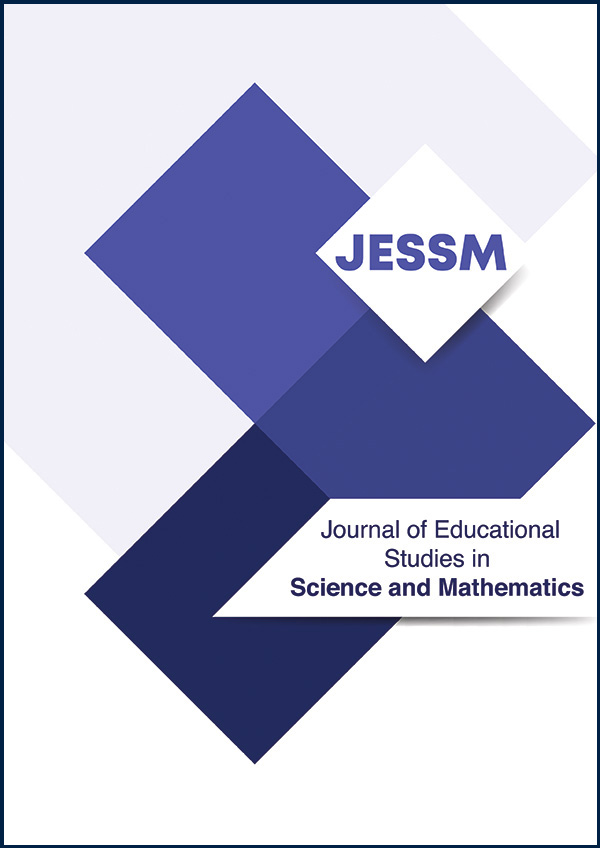Research article | Open Access
Journal of Educational Studies in Science and Mathematics 2022, Vol. 1(1) 41-55
Metacognition Awareness and Perceived Teacher Behaviors of Fifth-Grade Students
pp. 41 - 55 | DOI: https://doi.org/10.29329/jessm.2022.498.3
Publish Date: December 29, 2022 | Single/Total View: 139/845 | Single/Total Download: 203/1.252
Abstract
The aim of the study was to examine the metacognition levels of middle school fifth-grade students and their perceived mathematics teacher behaviors in terms of different variables. A survey model of the quantitative research methods was used. Convenient sampling was adopted from non-random sampling types in the study. 292 fifth-grade students of a public school located in the Central Anatolian region participated. 'Students' Perceived Teacher Behaviors' (SPTB) and 'Metacognition Awareness Levels of Students' (MALS) scales were used as data collection tools. Students perceived teacher behaviors and their metacognitive awareness levels were analyzed in terms of gender and age. As a result of the analysis, the metacognition levels of fifth-grade students had no effect on perceived teacher behaviors, and found relationship was not statistically significant. There is no significant mean difference in fifth-grade students' metacognition beliefs and perceived teacher behaviors with respect to their gender.
Keywords: Gender, Metacognition Awareness, Middle School Students, Perceived Teacher Behavior
APA 7th edition
Sasmaz, Z., & Sevgi, S. (2022). Metacognition Awareness and Perceived Teacher Behaviors of Fifth-Grade Students. Journal of Educational Studies in Science and Mathematics, 1(1), 41-55. https://doi.org/10.29329/jessm.2022.498.3
Harvard
Sasmaz, Z. and Sevgi, S. (2022). Metacognition Awareness and Perceived Teacher Behaviors of Fifth-Grade Students. Journal of Educational Studies in Science and Mathematics, 1(1), pp. 41-55.
Chicago 16th edition
Sasmaz, Zuhal and Sevim Sevgi (2022). "Metacognition Awareness and Perceived Teacher Behaviors of Fifth-Grade Students". Journal of Educational Studies in Science and Mathematics 1 (1):41-55. https://doi.org/10.29329/jessm.2022.498.3
- Ataalkın, A. N. (2012). The effects of teaching based on metacognitive teaching strategies in science and technology education on students' metacognitive awareness and skills, academic achievement and attitudes [Unpublished master’s thesis]. Akdeniz University. [Google Scholar]
- Aydın, S., & Yeşilyurt, M. (2007). Student’s view about the language used in mathematics teaching. Electronic Journal of Social Sciences, 6(22), 90-100. Retrieved from https://dergipark.org.tr/en/pub/esosder/issue/6136/82317 [Google Scholar]
- Aypay, A., Cemaloğlu N., & Sarpkaya R. (2009). Bilimsel araştırma yöntemleri. Anı Publishing. [Google Scholar]
- Baker, L. (2010). Metacognition. International Encyclopedia of Education, 204-210. [Google Scholar]
- Başar, M., Ünal, M., & Yalçın, M. (2002). İlköğretim kademesiyle başlayan matematik korkusunun nedenleri. V. Fen Bilimleri ve Matematik Eğitim Kongresi, 16-18. Retrieved from http://www.fedu.metu.edu.tr/ufbmek5/b_kitabi/PDF/Matematik/Bildiri/t212d [Google Scholar]
- Bağ, H., Uşak, M. ve Caner, F. (2006). Üst biliş (metacognition). In M. Bahar (Ed.), Fen ve Teknoloji Öğretimi (pp. 249-276). Pegem A Publishing. [Google Scholar]
- Bloom, B. S. (2012). Human characteristics and school learning (2nd ed.) (D. A. Özçelik, Trans.). Pegem Academy. [Google Scholar]
- Bursal, M. (2019). SPSS ile temel veri analizleri (2nd ed.). Anı Publishing. [Google Scholar]
- Büyüköztürk, Ş., & Bökeoğlu-Çokluk, Ö. (2007). Sosyal bilimler için istatistik. Pegem Publishing. [Google Scholar]
- Cerit, Y. (2008). Öğretmen kavramı ile ilgili metaforlara ilişkin öğrenci, öğretmen ve yöneticilerin görüşleri. The Journal of Turkish Educational Sciences, 6(4), 693-712. Retrieved from https://dergipark.org.tr/en/pub/tebd/issue/26110/275093 [Google Scholar]
- Çelik, S. (2011). Relationship between perceived teacher attitude and 5th grade primary students’ level of self-concept [Unpublished master’s thesis]. Selçuk University. [Google Scholar]
- Duatepe, A., & Çilesiz, A. (1999). Matematiğe yönelik tutum ölçeği geliştirilmesi. Hacettepe University Journal of Education, 16(17), 45-52. [Google Scholar]
- Ekiz, D. (2017). Bilimsel araştırma yöntemleri (5th ed.). Anı Publishing. [Google Scholar]
- Erdoğdu, M. Y. (2013). Ana-baba tutumları ve öğretmen davranışları ile öğrencilerin akademik başarıları arasındaki ilişkiler. Sakarya University Journal of Education Faculty, 0(14), 33-46. Retrieved from https://dergipark.org.tr/en/pub/sakaefd/issue/11210/133881 [Google Scholar]
- Irak, M., Çapan, D., & Soylu, C. (2015). Üst bilişsel süreçlerde yaşa bağlı değişiklikler. Türk Psikoloji Dergisi, 30(75), 64-75. [Google Scholar]
- İflazoğlu Saban, A., & Saban, A. (2008). An investigation of elementary school teaching department students’ metacognition awareness and motivation in terms of some socio-demographic variables. Ege Journal of Education, 9(1), 35-58. Retrieved from https://dergipark.org.tr/en/pub/egeefd/issue/4912/67259 [Google Scholar]
- Oluk, S., & Başöncül, N., (2009). The metacognitive reading strategy usage level and it’s effect on science technologies and turkish course success of primary education 8th grade students. Kastamonu Education Journal, 17(1), 183-194. Retrieved from https://dergipark.org.tr/en/pub/kefdergi/issue/49070/626117 [Google Scholar]
- Özdemir, Ç. (2012). Exploration of perceived teacher acceptance-rejection in terms of some factors (attachment securities, gender, and socio-economic status) [Unpublished master’s thesis]. Maltepe University. [Google Scholar]
- Sezgin, M. (2013). The relationship between attitudes towards mathematics, academic self-efficacy and perceived mathematics teacher behaviors [Unpublished master’s thesis]. İstanbul University. [Google Scholar]
- Şahin, A. (2011). Effective teacher’s attitudes according to teacher’s perceptions. Ahi Evran Üniversitesi Kırşehir Eğitim Fakültesi Dergisi, 12(1), 239-259. Retrieved from https://dergipark.org.tr/en/pub/kefad/issue/59498/855255 [Google Scholar]
- Şentürk, H. & Oral, B. (2008). An assesment of some of classroom management studies in Turkey. Electronic Journal of Social Sciences, 7(26), 1-13. Retrieved from https://dergipark.org.tr/en/pub/esosder/issue/6140/82377 [Google Scholar]
- Pallant, J. (2017). SPSS kullanma kılavuzu SPSS ile adım adım veri analizi (2nd ed.) (S. Balcı & B. Ahi, Trans.) Anı Publishing. [Google Scholar]
- Tabachnick, B. G., & Fidell, L. S. (2013). Using multivariate statistics (6th ed.). Pearson Education. [Google Scholar]
- Ural, A., & Kılıç, İ. (2011). Bilimsel araştırma süreci ve SPSS ile veri analizi (3rd ed.). Detay Publishing. [Google Scholar]
- Uyanık Balat, G., Şimşek, Z., & Akman, B. (2008). A comparative study on mothers’ and teachers’ evaluation of behavior problems of children attending preschool education. Hacettepe University Journal of Education, 34, 263-275. Retrieved from http://www.efdergi.hacettepe.edu.tr/shw_artcl-526.html [Google Scholar]
- Woolfolk-Hoy, A. E. (2005). Educational psychology: Active learning edition (10th ed.). Allyn & Bacon. [Google Scholar]
